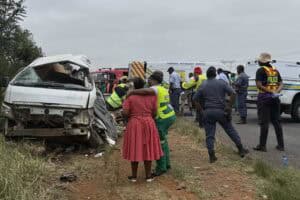The deputy minister of transport has been accused of being out of touch with reality after stating that 'for now, e-tolls are in force'.

Newly appointed Deputy Minister of Transport Sindisiwe Chikunga has been accused of being out of touch with reality after stating that “for now, e-tolls are in force” and if motorists drive on tolled roads, they have to pay.
Chikunga said during an eNCA interview: “You use the road that is tolled, you pay for it. You don’t use it, you don’t pay for it. It’s as simple as all that”.
“That is what the user-pay principle means and that is what the e-tolls are all about. If you don’t want to pay the tolls, you use other roads because they are there.”
She stressed that South Africa has to develop to evolve, and referred to a governor in the Cape in 1700 who collected money for road infrastructure.
“That was when people would stand on the road, as is happening in some of our neighbouring countries. We’ve evolved. We now have these schemes that we see on the roads where a boom gate has to open.“
“That is development and then technology is there and we said let’s collect them electronically. It’s the same system that started in the 1700s and it’s developing,” she said.
Chikunga said money from toll roads will be used to maintain South Africa’s roads and ensure they are at world level to maintain the country’s position of 18th in the world in terms of the national road quality.
But Chikunga said South Africa has to have money to maintain, develop, extend and expand its road infrastructure and this money will definitely not come from the fiscus.
“No country is able to maintain its road infrastructure with the money that is collected by their national treasuries, like it is the case in South Africa.
An ‘easy matter’ that has been complicated
“So for me, it’s such an easy matter that we have complicated. It’s just something that has developed from 1700 and we are where we are now.
“We have to service the money, the loan that we made, and we have got to pay [repay] as a country, whether we like it or not.
“So there is nothing that has changed [about e-tolls] for now. If there are new announcements, they will be made,” she said.
Organisation Undoing Tax Abuse (Outa) CEO Wayne Duvenage said the deputy transport minister is “banging a drum that has been banged for the last eight years since they launched e-tolls in 2013”.
“She clearly seems to not be au fait with the issues, not understanding the dynamics that have taken place over the last number of years,” he said.
Duvenage added that Chikunga was also not making sense in the context of Transport Minister Fikile Mbalula’s comments that he was seeking a “win-win” solution for government and society to the Gauteng Freeway Improvement Project (GFIP) e-toll saga.
“We understand that she is new but somebody has got to sit her down […] and bring her up to speed because it doesn’t look good for the department when the deputy minister makes comments that don’t make sense to society and just create more angst,” he said.
Future of e-tolls still unknown
Mbalula said in July during an interview with eNCA that a final announcement about the future of e-tolls, not only in Gauteng but across the country, was expected later that month.
“After July 19, you will get our response,” he said.
This followed Mbalula telling the National Council of Provinces (NCOP) on May 6 that a government announcement on the future of e-tolls would be made in the following two weeks.
Mbalula subsequently said during his budget vote speech on 21 May that a decision by the government on the future of the e-toll system is “imminent”.
Despite Mbalula creating the expectation of an imminent decision on the future of e-tolls on many other occasions, an announcement has not yet been made.
The long-outstanding decision on the future of e-tolls dates back to July 2019 when President Cyril Ramaphosa appointed Mbalula to head a task team, which also included then-finance minister Tito Mboweni and Gauteng Premier David Makhura, to report by August 2019 on the options available for the future of e-tolls.
Mbalula subsequently said he had presented nine possible solutions to the government to resolve the e-tolls impasse, the first of which is “to scrap the e-tolls”.
However, Mbalula highlighted the financial commitments that have been made in terms of the repayment of the debt to finance the GFIP and that the bigger issue for government is not the scrapping of e-tolls, but sustaining its position on the bond market by living up to its obligations by servicing the e-toll debt.






